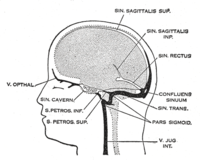
Photo from wikipedia
BACKGROUND AND PURPOSE Cerebral Venous Sinus Stenosis (CVSS) usually results in severe Intracranial Hypertension (IH), which can be corrected by stenting immediately. However, there is a lack of evidence of… Click to show full abstract
BACKGROUND AND PURPOSE Cerebral Venous Sinus Stenosis (CVSS) usually results in severe Intracranial Hypertension (IH), which can be corrected by stenting immediately. However, there is a lack of evidence of the long-term good outcomes in patients with CVSS who underwent stenting. METHODS A total of 62 patients with imaging confirmed non-thrombotic and non-external compression CVSS were enrolled into this single center real-world cohort study after undergoing stenting, and were continuously followed up for more than 12 years. The symptoms and signs of IH prior to stenting and post-stenting and the incidence of restenosis after stenting were analyzed. RESULTS The mean age of the 62 patients (range, 13 to 62) was 40 years old, and the mean body mass index was 26 (range 23 to 40). Females accounted for 67.7% (42/62). Headache was the most common symptom (79%). Transient visual obscurations occurred in 69% of the patients. 42% of the patients suffered from visual loss, 11.3% pulsatile tinnitus, and 96.8% Papilledema before stenting. The mean trans-stenotic pressure gradients were 6~43 mmHg prior to stenting and returned to 0~4 mmHg after stent placement. During the following 12~126 months (the median was 62) after stenting of the follow-up, 91.9% (57/62) of the patients obtained good outcomes. Headaches disappeared in 96% (47/49) of the patients and papilledema was attenuated in 98.3% (59/60). However, There were still 8.0 % (5/62) of the patients with poor outcomes, including optic disc atrophy in 3 patients and stent-interior thrombosis in 2 patients, which occurred 6.3 months after stenting. CONCLUSION Our data suggest that stenting may be a promising therapy for CVSS correcting. Patients with CVSS may get long-term benefit from stenting, especially when they are accompanied with severe IH.
Journal Title: Current neurovascular research
Year Published: 2019
Link to full text (if available)
Share on Social Media: Sign Up to like & get
recommendations!